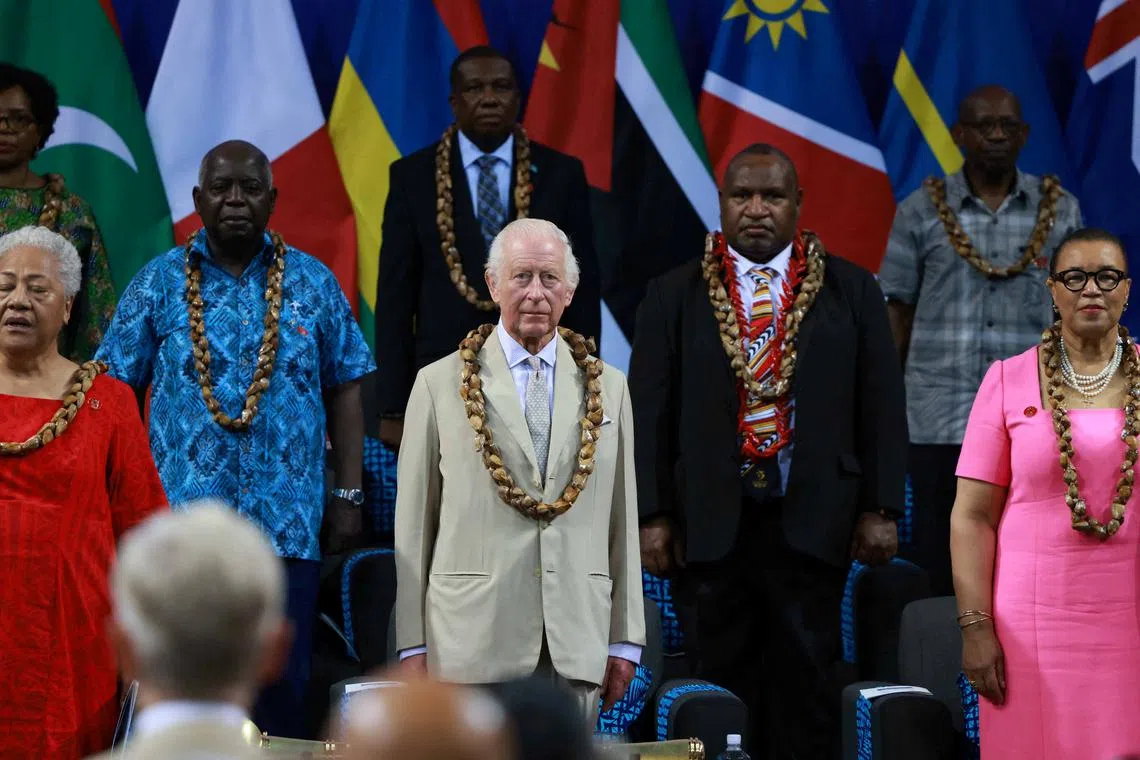King Charles acknowledges Commonwealth’s ‘painful’ history with slavery on summit agenda
Sign up now: Get ST's newsletters delivered to your inbox

Representatives of 56 countries, most with roots in Britain's empire, are attending the Commonwealth Heads of Government Meeting that began in Samoa on Oct 21.
PHOTO: REUTERS
Follow topic:
APIA, Samoa - Britain’s King Charles said on Oct 25 the Commonwealth should acknowledge its “painful” history, as African and Caribbean nations continue to advocate for reparations for Britain’s role in the transatlantic slave trade.
Representatives of 56 countries, most with roots in Britain’s empire, are attending the Commonwealth Heads of Government Meeting that began in Samoa on Oct 21
“I understand from listening to people across the Commonwealth how the most painful aspects of our past continue to resonate,” King Charles said in a speech to the summit.
“It is vital, therefore, that we understand our history, to guide us towards making the right choices in future.”
The demand for Britain to pay reparations or make other amends for slavery is a long-standing one, but has gained momentum worldwide, particularly among the Caribbean Community and the African Union (Caricom) and the African Union.
Opponents of reparations payments say countries should not be held responsible for historical wrongs, while those in favour say the legacy of slavery has led to vast and persistent racial inequality today.
British Prime Minster Kier Starmer has rejected calls for reparations and ruled out apologising for the country's historic role
The Guardian newspaper, citing a source from Mr Starmer’s office, reported late on Oct 24 that the Prime Minister had “opened the door to non-financial reparations”, such as restructuring financial institutions and providing debt relief.
Mr Starmer’s office did not immediately reply to a Reuters request for comment.
There are different types of reparations, from financial payments and apologies to technology transfer and educational programmes. Caricom has its own reparations plan.
Bahamas Foreign Minister Frederick Mitchell told the BBC on Oct 24 the summit's draft conclusion, expected to be published on Oct 26, had paragraphs calling for a discussion on reparations.
“If we say we want greater equality and equity in the world, the way to do this is to examine what and how reparations might manifest, rather than to shut down the conversation,” said lawyer Jacqueline McKenzie at London firm Leigh Day, where her team are investigating the potential for reparations claims.
From the 15th to the 19th century, at least 12.5 million Africans were kidnapped and forcibly taken by European ships and merchants and sold into slavery.
Those who survived the brutal voyages ended up toiling on plantations in inhumane conditions in the Americas, while others profited from their labour.
“We have demonstrated an unparalleled ability to confound the painful history which brought us together and sit together as equals for 75 years,” Commonwealth Secretary-General Baroness Patricia Scotland, a British diplomat and lawyer who was born in Dominica, told the summit. REUTERS

